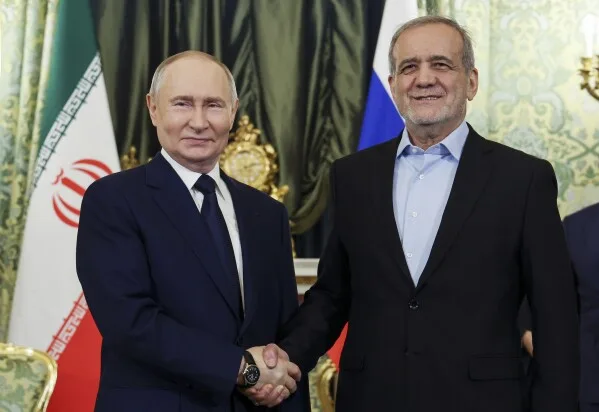The Kremlin announced its definitive readiness to expand cooperation with Iran in all areas.
The complex dynamics of global and Middle Eastern politics were highlighted by two distinct but equally significant diplomatic developments this week.
The Kremlin announced its definitive readiness to expand cooperation with Iran in all areas, cementing a rapidly deepening partnership that concerns Western powers.
Simultaneously, Saudi Crown Prince Mohammed bin Salman and French President Emmanuel Macron held a phone call focused on urgent efforts to address Gaza developments and regional stability, underscoring international efforts to find a solution to the ongoing conflict.
These actions reflect the intersecting, and often conflicting, agendas of major world players seeking to shape the future geopolitical landscape.
Global Power Plays: Russia Pushes Iran Ties Expansion While Saudi and France Tackle Gaza Developments and Regional Stability
Russia has made a bold statement of support for its “partner” Iran, declaring it is prepared to expand cooperation in all areas. This move comes amid heightened international scrutiny over Tehran’s nuclear program.
At the same time, a key diplomatic push to address the crisis in the Middle East saw the Saudi crown prince and the French president discuss Gaza developments and regional stability—a clear signal of concerted efforts by Riyadh and Paris to steer the volatile region toward a comprehensive peace based on the two-state solution.

Headline Points
• Russia-Iran Deepening: The Kremlin affirmed its readiness to expand cooperation with Iran in all areas, describing their relations as “very dynamically” developing.
• Partnership Focus: The expansion builds on a strategic partnership agreement signed in January 2025 and includes significant defense and energy cooperation, notably a $25 billion nuclear plant deal.
• Gaza and Stability: The Saudi Crown Prince and the French President stressed the need to alleviate humanitarian suffering in Gaza and underscored the urgency of achieving a just and lasting peace.
• Two-State Solution:
Both leaders reaffirmed the need to take practical steps toward a peace based on the two-state solution and called for a complete Israeli withdrawal from the Gaza Strip.
• Diplomatic Pressure:
Kremlin spokesman Dmitry Peskov accused European countries of placing “excessive pressure” on Iran regarding its nuclear program negotiations.
Kremlin Affirms Unreserved Partnership with Iran
The statement from Moscow signals an unreserved commitment to its bilateral relationship with Tehran, positioning the two nations as increasingly close strategic partners on the world stage.
Kremlin spokesman Dmitry Peskov was unequivocal, stating: “Russia is definitely ready to expand cooperation with Iran in all areas. Iran is our partner, and our relations are developing very dynamically.”
This affirmation comes as an envoy for Russian President Vladimir Putin is scheduled to meet with Iran’s Supreme National Security Council Secretary, Ali Larijani, to further coordinate their joint interests.
The expanding relationship is anchored by the Treaty on Comprehensive Strategic Partnership signed by President Putin and his Iranian counterpart, Masoud Pezeshkian, in January. Key elements of this expanding partnership include:
• Energy Cooperation:
The Russian state nuclear energy giant, Rosatom, signed a $25 billion deal in September to construct four new nuclear power plants in Iran.
• Military Ties:
Moscow continues to assert it legally supplies Tehran with military equipment, while Iran has supplied Russia with drones for use in the conflict in Ukraine.
• Political Backing:
Moscow stood by Tehran following US and Israeli strikes on Iranian nuclear sites earlier this year, publicly condemning the actions.
Peskov also used the opportunity to criticise Europe, claiming European countries are applying “excessive pressure” on Iran in negotiations over its nuclear programme.
The determination to deepen ties is viewed by analysts as a continued convergence of interests between countries facing increasing international sanctions and diplomatic isolation from the West.
